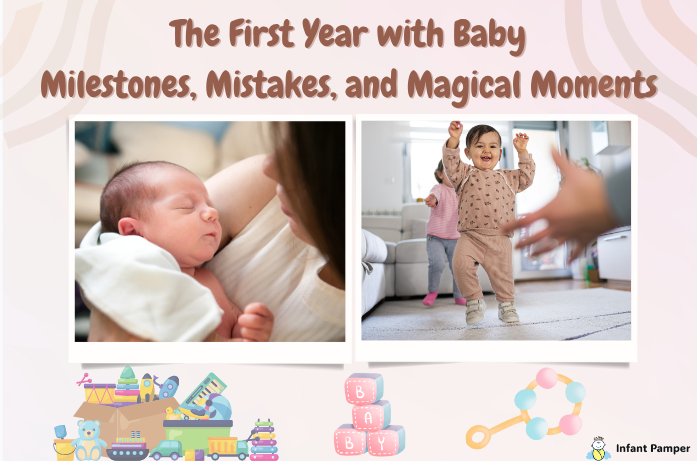By Infant Pamper
Welcoming a baby into your life is a moment that changes everything. One filled with sleepless nights, parenting challenges in the first year, countless questions, and heart-melting smiles. The first year of a baby’s life is an extraordinary journey, not only for your little one but for you as well. This period is packed with baby first-year milestones month by month, common mistakes that every new parent makes (and learns from), and unforgettable magical moments that make everything worth it.
In this guide, we’ll tell you what to expect in your baby’s first year, providing practical parenting tips for the first year, reassurance, and insights from experienced parents.
Why the First Year Matters So Much
Your baby’s first year is a time of rapid growth and learning. According to the American Academy of Pediatrics (AAP), a child’s brain doubles in size during the first year. The Harvard Center on the Developing Child also highlights how early interactions shape lifelong cognitive and emotional development. Every cuddle, conversation, and smile helps shape their world.

Baby First-Year Milestones Month by Month
Month 1–3: The Newborn Phase
- First social smile around 6–8 weeks
- Begins tracking objects with eyes
- Pushes up during tummy time
Parent Tip: Skin-to-skin contact is magic. It helps regulate your baby’s temperature and promotes bonding.
Month 4–6: The Emerging Personality
- Rolling over and giggling
- Babbling begins, signaling early language development
- Some babies start sitting with support
Pro Tip: Encourage tummy time daily, it’s crucial for muscle development and recommended by HealthyChildren.org (AAP resource).
Month 7–9: The Explorer Stage
- Crawling or scooting begins
- Fine motor skills improve as your baby picks up objects
- They might even try standing up using furniture for support
Safety Tip: Baby-proof your home following advice from Safe Kids Worldwide for all this new movement!
Month 10–12: Standing Tall
- Most babies pull to stand and may take first steps
- First words like “mama” or “dada” often appear
- Interactive play becomes a favorite
Parent Tip: Encourage walking by offering safe furniture for cruising and celebrate those magical first steps.
For detailed checklists, visit HealthyChildren.org and the CDC developmental tracker.

Common Mistakes New Parents Make in the First Year (And How to Avoid Them)
1. Comparing Your Baby to Others
Every baby develops at their own pace. If you’re concerned, consult your pediatrician or trusted resources like AAP or KidsHealth, not random forums.
2. Overloading on Baby Gear
Babies need love, attention, and the basics. Refer to safety certifications by Juvenile Products Manufacturers Association (JPMA) for essential items.
3. Ignoring Self-Care
How to survive your baby’s first year? Parent burnout is real. Caring for a newborn is exhausting. Sleep is essential for your physical and mental health. While “sleep when the baby sleeps” sounds simple, it’s not always practical. So, prioritize short naps whenever possible, share night duties with your partner, and don’t be afraid to ask for support. Taking care of yourself isn’t selfish; it ensures you have the energy and emotional balance to care for your baby.
4. Skipping Tummy Time
One of the most common parenting mistakes in the first year. Tummy time prevents flat head syndrome and is recommended by both AAP and Zero to Three for motor development.

Magical Moments in Baby’s First Year to Treasure
- The first real smile: Pure joy.
- The first laugh: Makes every sleepless night worth it.
- Hearing “Mama” or “Dada”: The sweetest sound.
- First steps: A proud moment for the whole family.
Capture these not just for Instagram, but for your heart.
Tips to Make the First Year Easier
- Trust Your Instincts: You know your baby best.
- Build a Support Network: Friends, family, or parenting communities.
- Read Authoritative Resources:
American Academy of Pediatrics (AAP) – HealthyChildren.org
Centers for Disease Control and Prevention (CDC) - Stay Flexible: Babies are unpredictable. Flexibility is your superpower.
✅ FAQs for New Parents
Q1: How much should my baby sleep?
Newborns need 14–17 hours a day in short stretches (National Sleep Foundation).
Q2: When will my baby say their first word?
Usually between 10–14 months; variations are normal (AAP).
Q3: What if my baby skips crawling?
Some go straight to walking, which is normal (HealthyChildren.org).
Q4: Is it okay to co-sleep?
Experts like the AAP recommend a separate sleep space to reduce SIDS risk.
Q5: When should I start solids?
Around 6 months, when readiness signs appear (WHO guidelines).
Final Thoughts
The first year with your baby is a beautiful, challenging, and magical experience. You’ll make mistakes (every parent does), but these magical moments in baby’s first year will outweigh every challenge. Remember, perfection isn’t the goal, connection is.
👉 Want more practical parenting tips for the first year? Visit Infant pamper for expert guides and real-world advice.
Disclaimer: This article is for informational purposes only and not a substitute for professional medical advice. Always consult your pediatrician for concerns.




